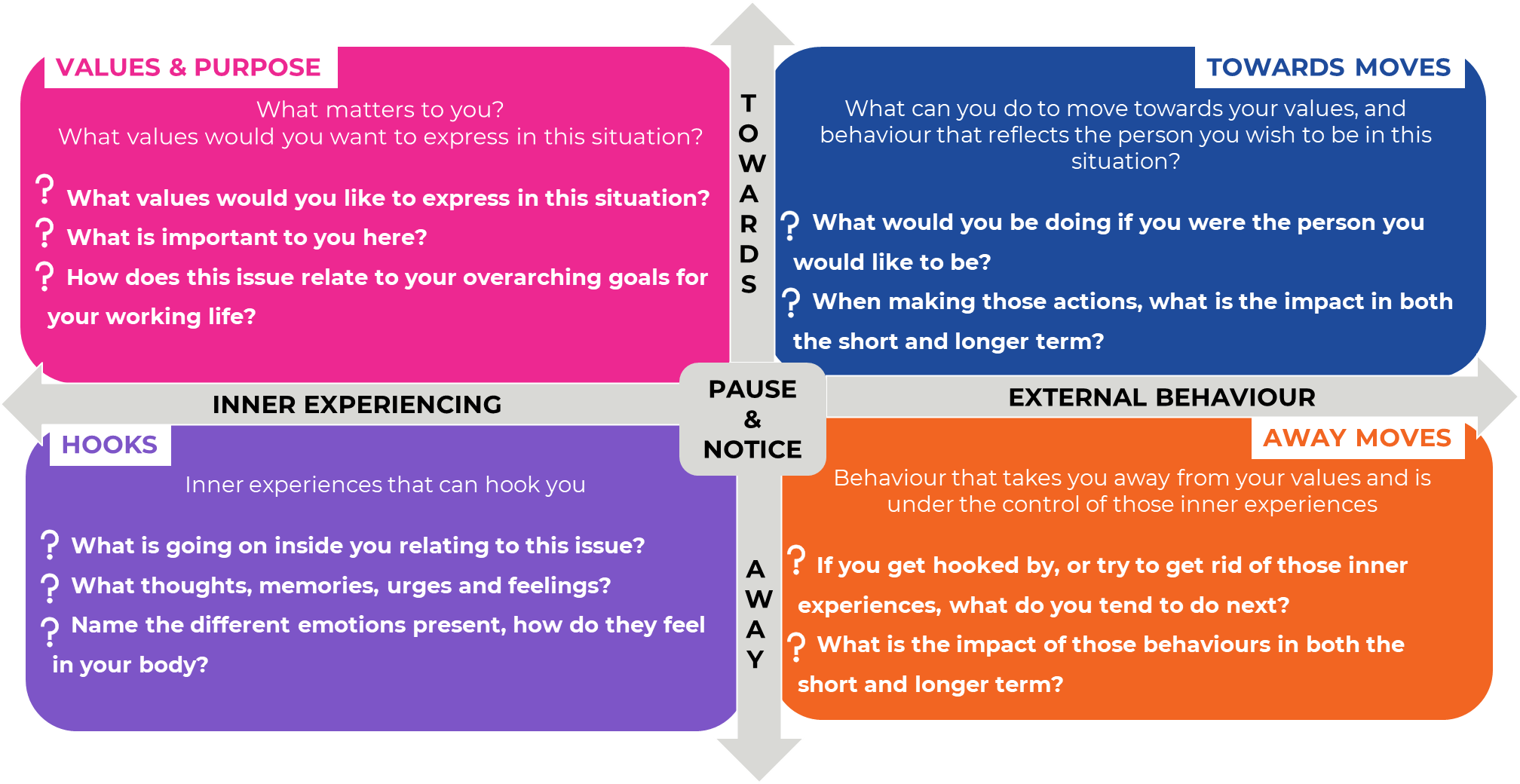Becoming stuck
Many people end up in jobs or careers that may have originally been satisfying, but now don’t fit with their current personal situation (such as family or caring commitments) or feel boring or ‘not right’ anymore. It may also feel like you have achieved all your work goals but are still unfulfilled. You are stuck: the normal way of doing your job isn’t working anymore, or you cannot get that next promotion.
These situations then often lead to feelings of worry, stress and anxiety, and even hopelessness and frustration, leaving us unable to move forward. These difficult feelings can then start to drive behaviour, including conflict with work colleagues or management, or being more irritable at home. We can end up spending more time ‘in our heads’: worrying about the future and dwelling on the past, perhaps incapable of taking action towards positive change.
It is important to recognise that life can feel chaotic and unpredictable; many situations do not have a clear right or wrong solution. However, Acceptance and Commitment Therapy (ACT) can help us to become unstuck from unhelpful thoughts and feelings, and take action towards the lives we really want, despite uncertainty and setbacks.
ACT
Acceptance and Commitment Therapy was first developed in 1987 by psychologist Steven Hayes, as an evidence-based form of psychotherapy: using mindfulness, acceptance and values-based methods to help people to accept what is out of personal control and commit to action that improves and enriches their lives. Since then, there has been extensive theory and practical research evidence gathered that supports ACT as beneficial and effective (APA Presidential Task Force on Evidence-Based Practice in Psychology, 2006). Russ Harris (see below) and others have also actively promoted ACT as being valid not only in clinical and therapy settings, but also within the workplace and personal life (Harris, 2006).
Although ACT has the word ‘therapy’ in it, within the workplace this is not in the traditional sense of seeing a counsellor or therapist; the tools and suggestions have been developed for everyone to use in a way that best suits them and their situation.

- Acceptance
The ‘A’ (acceptance) part of ACT is about accepting your thoughts and feelings. However, it is not about passively resigning yourself to them, but becoming open and aware, conscious of inner thoughts and feelings, and how these may drive behaviours that lead to being ‘stuck’.
- Commitment
The ‘C’ (commitment) is choosing (being active) to move in the direction of your values: choosing behaviours that reflect the things that matter the most to you, for the way you want to live and work. See below for more on values and help with identifying these.
- Taking Action
Rather than therapy, it can be useful to think of the ‘T’ as ‘taking action’, so overall, ACT is about being open, aware and active – doing what matters, so that personal and working lives become more meaningful. Let’s explore this further...
Open, aware and active
So how could ACT help in our working lives? Importantly, ACT is not about reviewing your past to find hidden meaning and answers, nor about finding unhelpful thoughts to ‘get rid of them’. Instead, anyone can transform their lives by being three simple things – open, aware and active.
- Open
Learning to respond more effectively to the inevitable painful and unhelpful thoughts and feelings we all have, removing the barriers to taking meaningful action.
- Aware
Being present and connecting with what is happening around us right now, switching off autopilot and not dwelling on the past, or worrying about the future. This is where the skill of mindfulness can help us to notice the opportunities we may miss when we are caught up in our thoughts and feelings. You can learn to just simply notice the thought is there and stop fighting with it. For more on mindfulness, please see Five Reasons Why You Should Care About Mindfulness.
- Active
Learning what matters most to us and then pursuing these things, no longer drifting through life unconsciously or being driven by worrying thoughts. What kind of person are you? What kind of life do you want to live? Take committed steps in that direction, despite the challenges. This is where knowing our own values is imperative.
Values
The key to knowing what matters, so we move towards a more fulfilling working life, is to first understand what values are and then identify the ones that mean the most to us. Dr Russ Harris, a leading ACT trainer and author, explains more about values.
Values Questionnaire activity
Completing a Values Questionnaire may also help identify your values. Try the activity in Identifying Values – Finding the Things that Matter the Most to You for the Way You Live and Work before coming back here to learn more about the ACT Matrix.
The ACT Matrix
It all sounds easy on paper but, as with all change, being open, aware and active will take time, and it may seem challenging to apply this to stressful situations. This is where the ACT matrix (adapted from Kevin Polk, Rachel Collins and Russ Harris) is designed to enable you to challenge your thinking about specific situations you find yourself in, or issues you are experiencing, whether at work or in life in general. It is extremely useful when you feel stuck in your thinking or behaviours. What can you do more in your working life towards what is important to you and become ‘unstuck’?

On his ACT Mindfully website, Russ Harris also provides lots of free resources to help more with developing ACT skills and it may also be useful to discuss this further with a trustworthy colleague or friend.
There are also further resources you may find useful in the Applying Psychology at Work Hub, including:
The value of Emotional Intelligence in a Challenging Workplace.


Rate and Review
Rate this article
Review this article
Log into OpenLearn to leave reviews and join in the conversation.
Article reviews